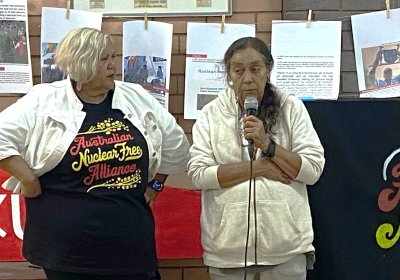Stop AUKUS WA organised a peaceful protest outside the West Australian Defence Forum. Riley Breen and Blair Vidak report.
AUKUS
Hidden amid the AUKMIN chatter about the “complex international order” was Australia’s promise of billions to help Britain’s flailing nuclear reactor production line. Binoy Kampmark reports.
First Nations people and supporters, including unionists, began a 400-kilometre peace walk against the AUKUS military alliance aiming to deliver a message to Canberra. Jim McIlroy reports.
University leaderships have a lot of work ahead of them to convince researchers of the worth of AUKUS, argues Rowan Cahill.
Regardless of whether Australia acquires any nuclear-powered vessels, the rest of the AUKUS deal, including interoperability with the United States, is already underway. Paul Gregoire reports.
Labor is playing a game over Gaza. To claim to support a ceasefire while arming and giving political cover to the perpetrators of genocide is sick cynicism, argues Sam Wainwright.
Nick Riemer and Markela Panegyres argue that universities should insist on science and knowledge serving the cause of peace and human progress, and not fuel the arms race.
The Palestine solidarity movement is shaking politics up: 81% want Israel to ceasefire and 53% want Labor to take more action to achieve a ceasefire. Chloe DS reports.
Representatives of more than 30 community organisations met to discuss working more closely to oppose AUKUS and the US-Australia war drive against China. Kerry Smith reports.
Prudence alone demands we pause AUKUS, as the terms of its final provisions allow signatories to do. Ken Blackman reports.
We must stop normalising the “revolving door” phenomenon — the movement of individuals from public office to private companies and vice versa, argues Jacob Andrewartha.
An independent foreign policy would involve a policy of neutrality; it would mean Australia could pursue peaceful and mutually beneficial relations with all countries, argues Bevan Ramsden.
- Previous page
- Page 3
- Next page











